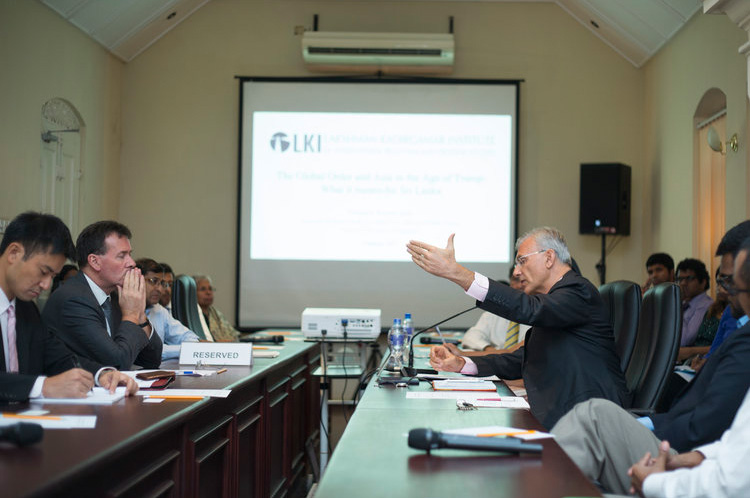Takeaways – Razeen Sally on the Global Order and Asia in the Age of Trump
January 6, 2017 Reading Time: 3 minutes

Reading Time: 3 min read
Introduction
- Professor Razeen Sally, Associate Professor at the Lee Kuan Yew School of Public Policy of the National University of Singapore, was the keynote speaker at a LKI Foreign Policy Round Table on 6 January 2017, where he spoke on “The Global Order and Asia in the Age of Trump: What it means for Sri Lanka.”
- The round table was attended by senior officials of the Ministry of Foreign Affairs and the diplomatic corps, as well as by heads of leading private sector organisations, and representatives of other governmental bodies, international organisations, think tanks,and the press.
Key Takeaways
- Professor Sally presented three scenarios that could occur under a Trump administration, and considered their implications for Sri Lanka.
- The US continues to maintain leadership and engagement in Asia through the provision of regional and international public goods. This would ensure regional peace and security, and facilitate further globalisation and prosperity in Asia.
- The implications of this first scenario for Sri Lanka could include market reforms, ethnic reconciliation, a liberal polity, and a balanced foreign policy featuring good relations with China, India, Europe, and the US.
- The US becomes more protectionist and isolationist, especially on the security front. This could lead to more Chinese opportunism, particularly in the South China Sea, the East China Sea, on land, and in the Indian Ocean. Chinese opportunism, however, is unlikely to translate into a power shift of China taking over from the US.
- The implications of this second scenario for Sri Lanka could include a prolonging of Sri Lanka’s present state, which includes no serious economic reforms, ethnic tension without outright conflict, and a foreign policy that drifts back to China, resulting in weaker relations with India and the West.
- The US disengages from the region. Diminished US leadership in the region would leave more space for China to play a more influential role. This may translate into higher levels of disorder, with a serious upset in the balance of power. That kind of geopolitics could translate into economic and political uncertainty.
- The implications for Sri Lanka of this third scenario could include a statist economy, greater reliance on China in our foreign policy, an illiberal democracy, and higher levels of corruption.
- The most desirable scenario for Sri Lanka is the first, in which the US remains central to the region. The alternatives are undesirable for the economy and for security.
- Sri Lanka should maintain its level of engagement with the US, even under a Trump Administration, and be cautious in assuming that the US is diminishing as a global power.
- The US has a tried and tested constitution with checks and balances, which would constrain President Trump and assist in maintaining the global role played by the US.
- The US has provided essential international and regional public goods that have facilitated openness and stability. Those public goods cannot be provided to the same level by any other region or country, such as Europe or China, at least in the foreseeable future.
- The US provides public goods related to security in Asia in the form of “boots on the ground,” the Fifth and Seventh fleets, key bilateral relationships, and treaty alliances.
- The US also provides public goods related to economics in the form of global value chains, and openness to trade and capital flows.
- These international public goods have contributed to regional peace and security in Asia.
- Regional peace and security has enabled East Asia to develop, and South Asia to catch up. Diminished US leadership and engagement in the region could result in the reversal of this trend, or a prolonging of the current levels of economic and political development.
- China does not have a tradition of providing international or regional public goods. In addition, China would not be in a position to provide global leadership for the foreseeable future, as the country is tackling a host of domestic political and economic challenges.
- It is not possible for states to combine forces to provide international and regional public goods, as concerts of international cooperation require US leadership to be highly effective.
Click here to listen to Professor Sally’s presentation.
Suggested Further Reading
De Zylva, A. and Waidyatilake, B. (2016). Six Perspectives that Explain Trump’s Views on Asia. Lakshman Kadirgamar Institute.
Panditaratne, D. (2017). What Did Trump’s Inaugural Address Say on Foreign Policy?, International Policy Digest.
Rapp-Hooper, M. (2016). Deciphering Trump’s Asia Policy. Foreign Affairs.
Rosand, E. (2017). Why Trump needs the United Nations. Brookings.edu.
Tharoor, S. (2016). The End of US Soft Power?. Project Syndicate.
Quah, D. & Crabtree, J. (2016). New age of anxiety as Trump strikes security, trade deals. The Straits Times.
Economist.com. (2017). What Donald Trump’s appointments reveal about his incoming administration.
